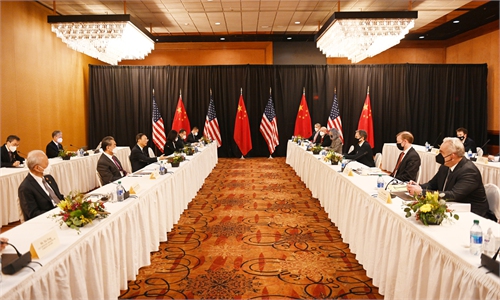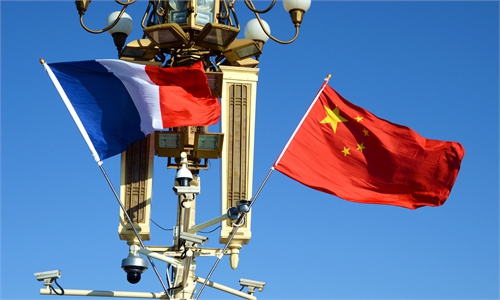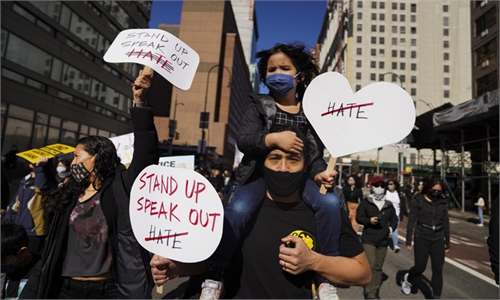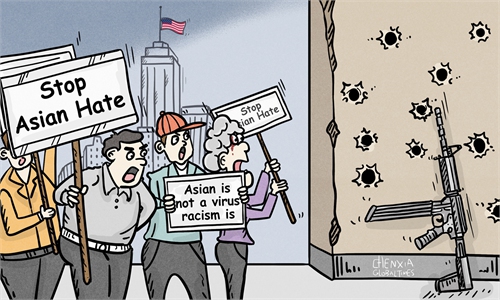Deep-rooted US racism, inherited Sino-skepticism from previous admin mean no easy to ‘Stop Asian Hate’
Deep-rooted US racism, inherited Sino-skepticism from previous admin mean no easy to‘Stop Asian Hate’
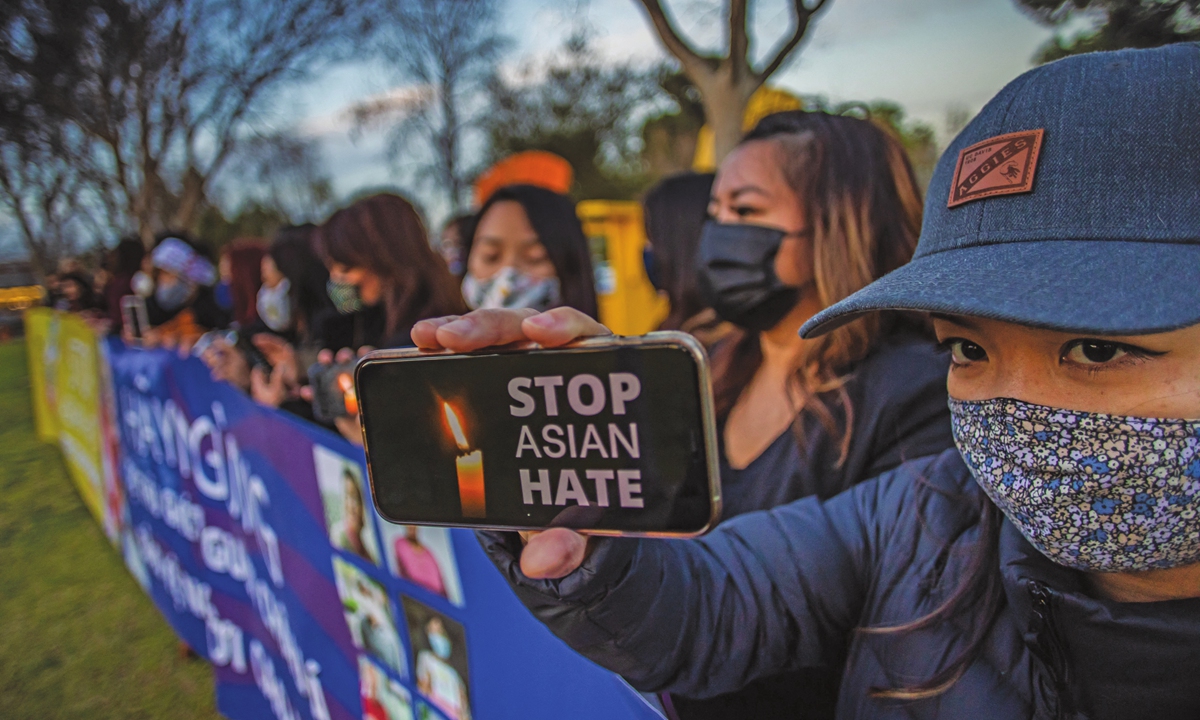
Julie Tran holds her phone during a candlelight vigil in Garden Grove, California, the US, on March 17, 2021. Photo: AFP
The anxiety and pain that Chinese Americans have long endured with various cold looks and verbal abuse were finally ignited by the bullets and fists from white men. The silent Asians, who are used to holding back, finally let the whole of American society hear their own pained cries.
As protesters hold signs reading "Asian Lives Matter" and "Make Racism Wrong Again" while raising their arms and shouting, within a few days, "Stop Asian Hate" demonstrations swept across the United States. Chinese Americans took to the streets along with people from different races and nationalities.
"This time, Asian Americans will not continue to cower at home and wait for time to wash things away," Feng Yi, a resident of San Francisco, told the Global Times.
Facing the death of six Asian women in the latest Atlanta shootings and a series of malevolent crimes against Asians, many local Chinese Americans are now calling on more of their counterparts to "stand up." "We are not united just for this highly visible moment, but start together to build a foundation for Asians to gain a foothold in America!"
However, many struggling Chinese people question how much they can achieve with their protests. How long can such a moment of peace and national attention be maintained?
Experts told the Global Times that in the face of the US government's increased hostility toward China and the continued festering legacy of former president Donald Trump, deep-seated hatred toward Asians will continue to loom over America and further tear it apart.
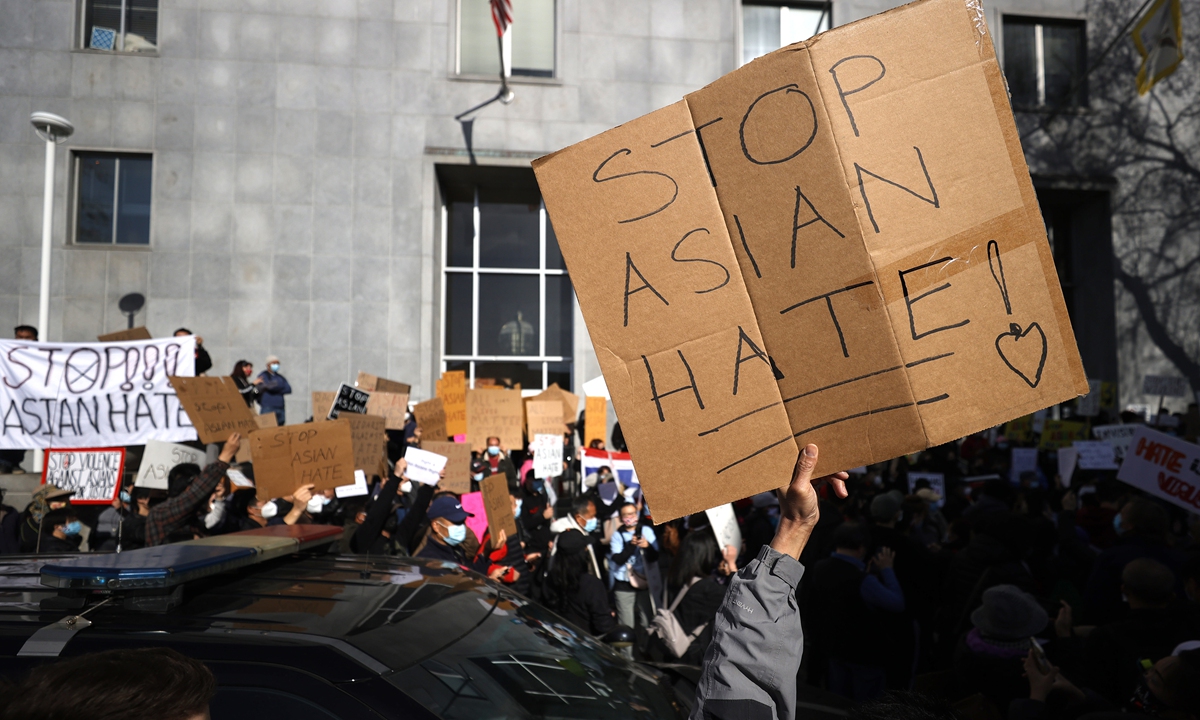
Protesters hold signs during a rally in solidarity with Asian hate crime victims on March 22 in San Francisco, California. Photo: VCG
Chronic disease deteriorates
"Every time a new attack against Asian Americans happens, it will make us feel more vulnerable. We are also tired of the fact that the escalating insults we suffer are being ignored by the authorities over and over again," a Chinese American left a comment under the news of the Atlanta shooting.
The scars of hate crimes against Asians have finally been uncovered after a white 21-year-old gunman went on a shooting rampage at three Atlanta-area spas and massage parlors.
Although the local police downplayed the killer's motives as "not racist," a series of vicious incidents subsequently exposed further showed to the world that Asians, who were originally part of the marginalized groups in the US, were suffering even more harm.
On March 14, Maria Ha, a Korean-American fashion blogger in New York, was verbally abused by the daughter of American politician Daniel Patrick Moynihan for no reason on the street, telling her to "Go Back to China." On March 18, two elderly Asians were violently attacked by a white man on the streets of San Francisco in one day.
While it made people clap their hands for Xie Xiaozhen, the 76-year-old elderly Chinese woman who bravely fought back against the attacker's fists, her family told the Global Times the granny was in a state of panic.
Currently Xie donated all the $890,000 raised by over 30,000 netizens to help the Asian community. "We cannot give in to racism. If necessary, we must fight to the death," she said.
"There are far more incidents of Asian hate around us than what are reported in the news," Philip Choi, advisor of the Chinese American Association of Commerce living in San Francisco, told the Global Times. He also took part in several rallies against anti-Asian racism in the Bay Area.
Choi noted that in the past few months, several elderly Chinese people have died due to violent hate crime attacks in San Francisco, and there were also many Chinese shops that were vandalized and looted.
"Now the vulnerable groups can more easily be subject to discriminatory cases against Asians, which have gripped my heart," Choi said.
Zhou Yanyu, executive president of the Chinese American Culture Exchange Association living in Los Angeles, told the Global Times that since the outbreak of the COVID-19 pandemic, too many Chinese people have been living in fear, and have had to be mentally prepared to deal with the crisis at any time.
Now she is leading local Chinese people to join the Asian rights organizations across the US and actively raised money to hire lawyers and provide protection for Chinese people who suffered discrimination.
Zhou said that not long ago, a gang of teenagers in Orange County harassed her compatriots around the clock, smashing glass doors with stones. The situation was improved when local Chinese people set up patrols to ensure the safety of their communities.
Zhou pointed out that in the past, Chinese people mainly faced verbal insults, but now there are many people who even had their lives seriously threatened. "Currently, we are even afraid to wear headphones to listen to music while walking, because we must always pay attention to what is going on around us."
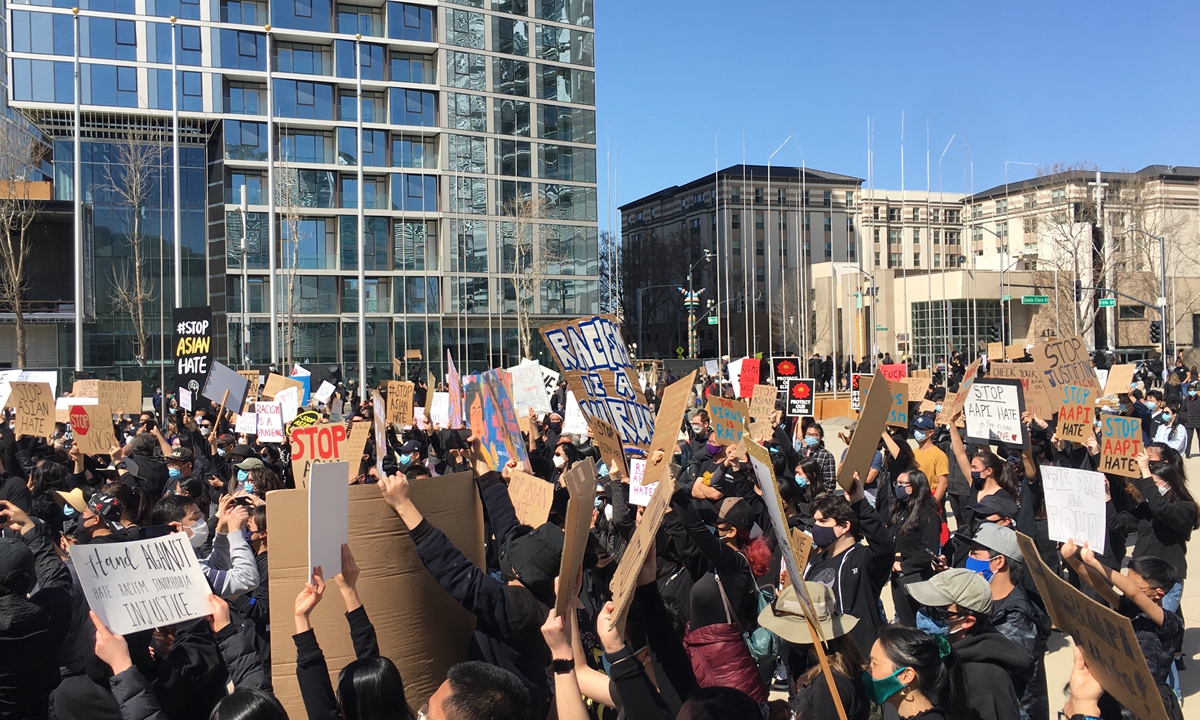
A protest held in San Jose, California, on March 21 in solidarity with innocent Asian victims of hate Photo: Feng Yi
Deep-rooted prejudice
"Since at least February 2020, Chinese Americans have become the target of xenophobic and racist attacks, and assaults due to a culture of ignorance and the spreading of false information that Chinese people, and by extension anyone who appears Asian, are to blame for the fear and damage caused by the COVID-19 pandemic," Waylae Gregoire, Editor-in-Chief of NextShark, an Asian-American news site, told the Global Times.
Choi believed that US society's rising racism against Asians was fueled mainly by former US president Donald Trump's disparaging of China over the COVID-19 pandemic, noting many are also venting their dissatisfaction on Chinese people after the US economy was battered by the pandemic.
"Hate can breed quickly, but it is not easy to eliminate," he added.
According to a report issued by Anti-Defamation League (ADL) in March 2021, Asian-American respondents experienced the largest single year-on-year rise in severe online harassment in comparison to other groups, with 17 percent this year compared to 11 percent in the 2020 report. More than half of Asian-American respondents said that online harassment is based on their race.
The ADL also said that "the spike in physical violence against Asian-Americans across the US was whipped up in large part by bigotry and conspiracy theories that grew online, fanned by national leaders, including former President Donald Trump's incendiary rhetoric blaming China for the pandemic and referring to the virus as the 'China plague' or 'kung flu.'"
"Asian Americans have witnessed and suffered a surge in hate crimes in the COVID-19 era. However, before the shooting, most Americans ignored this frightening trend or even applauded these hateful behaviors," a Chinese scholar surnamed Li, working at a university in Portland, told the Global Times.
Li said although Trump has left office, the mess he left behind is still pushing the US into the abyss, as there are still many opportunistic politicians and media outlets that keep vilifying China and condoning the spread of extremist ideologies and racist rhetoric to deflect responsibility.
The latest USA Today and Ipsos poll found that one in four Americans have recently witnessed Asian people being blamed for the COVID-19 pandemic. Compared to 46 percent of Asian respondents who said they have witnessed Asian people being blamed for the COVID-19 pandemic, only 18 percent of white respondents have witnessed this.
Li pointed out that the Biden administration has yet to deliver on election promises to protect minorities. "This is the new America, where the bad economy has not fully recovered but social tensions have reached new highs," Li said.
Hua Chunying, spokesperson of the Chinese Ministry of Foreign Affairs, urged the US government to protect the legal rights of Asians at a press conference.
"We hope that the US side will match its words with deeds, and take concrete actions to truly protect the legitimate rights and interests of ethnic minorities, including the Asian community, and prevent them from being discriminated, attacked, hated or even killed," Hua said.
However, given that the American society has always advocated Darwinism, a theory in which the strong eat the weak and only the fittest can survive, the issue of racial discrimination in the US cannot be solved within a single administration, Li Haidong, an expert from the China Foreign Affairs University in Beijing, told the Global Times.
Ethnically Chinese people make up about 1.5 percent of the US population, making them a veritable minority, and for a long time, they lived at the bottom of American society.
"The Chinese-Americans have gradually become silent 'model citizens' through their hard working, who are well educated and live comfortably, but being afraid of getting into trouble. They usually only care about their own affairs, and when faced with hatred from other classes or races, they are still accustomed to keeping silent even when they are angry about it," Li Haidong said.
Just a moment of peace
Such a situation has finally seemed to have some changes.
Many Chinese Americans expressed that they cherish this moment of national attention and mutual support from all ethnic groups, but are confused and worried about how far they can go to defend their rights, and whether they can obtain a deeper and more comprehensive "equality."
"The current focus on violence and superficial discrimination may give Asians a moment of peace, but behind the bigotry and hatred toward Asians, there are countless problems that need to be addressed," Jason Zhang (pseudonym), leader of a Chinese association living in Boston, told the Global Times.
The reason why Zhang declined to give his real name is that his association, a civil organization dedicated to promoting communication between China and the US, has been restricted by the US government in the past year for being classified as a Chinese "diplomatic mission."
The US government's hostility toward China, the arbitrary surveillance and interrogation of Chinese scholars in universities, and the accusation that Chinese engineers in high-tech companies are spies for the Chinese government have all had a huge impact on the normal work and life of Chinese people, but these issues have gone unnoticed so far, Li said.
"Sadly, freedom of speech in America depends on what you say," Zhang sighed.
In the wake of the Atlanta shootings, Melissa Chan, an American journalist who works for Deutsche Welle commented on Twitter that "In addition to condemning anti-Asian attacks, these experts note that racism serves as propaganda gold for China which attempts 'to portray itself as the head of the global Chinese diaspora.'"
The US is flooded with prejudice, short-sightedness, and Western centrism, especially among the elite class, and they don't really want to solve problems affecting other ethnic groups, Li Haidong said, noting that the discrimination faced by Chinese Americans will definitely worsen as the strategic competition between China and the US intensifies.
"It is not new that the conflicts between the US with countries of origin of many of American minorities lead to more discrimination and severe situation within the US toward them," Li Haidong said.
"Just like a ghost wandering around, in the short term, the US will not be able to bridge the gap between the various ethnic groups, and it will continue to suffer from further internal divisions," he added.
